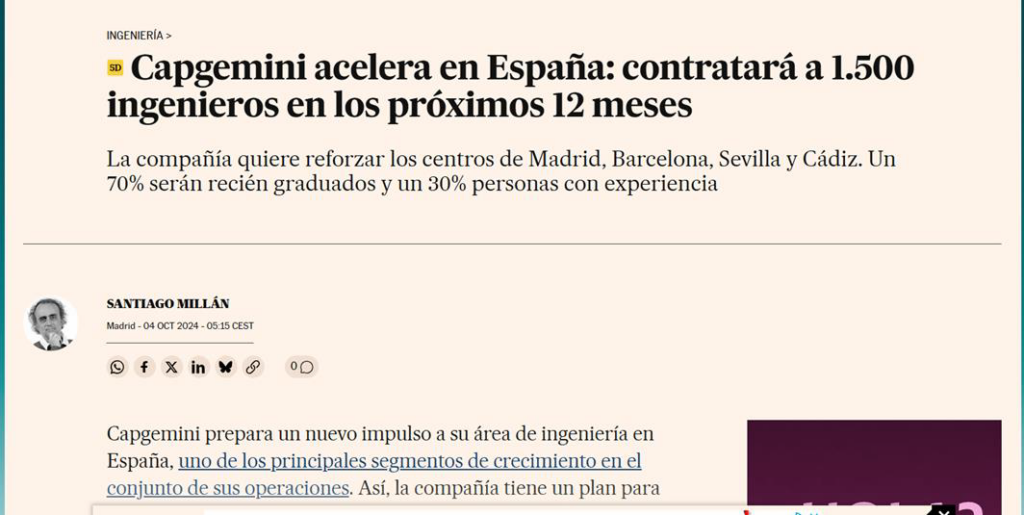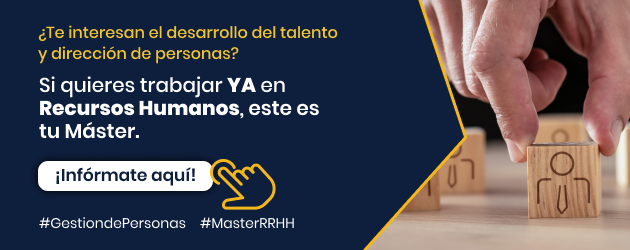Promoting talent
In a constantly changing world, companies face increasingly complex challenges in the technological, energy, and social spheres. These dynamics require highly skilled professionals who can lead innovative projects and ensure that organizations remain competitive in a constantly changing market. The recent news that Capgemini will hire 1,500 engineers in Spain is a clear example of this trend. This isn't just an increase in demand for technical profiles, but also a growing need for strategic professionals capable of leading teams and projects in key sectors.
The crucial role of talent in strategic sectors
Sectors such as digital transformation, renewable energy, and advanced engineering are defining the direction of the global economy. These areas not only drive the development of new technologies but also have a direct impact on sustainability and people's quality of life. However, to ensure success in these sectors, companies need much more than cutting-edge technology: they need talent.
Talent is not simply a resource; it's the engine that turns ideas into innovation and projects into results. But not just any talent can face the challenges of the future. Organizations seek professionals with advanced technical skills, but also the strategic capacity to lead in an uncertain and changing environment. This is where quality training becomes a decisive factor.
The importance of specialized training
Training the right professionals for these challenges is no simple task. Companies need more than technical knowledge; they require profiles capable of adapting to new market demands and anticipating future changes. In this sense, institutions like EIP International Business School play a fundamental role in preparing tomorrow's leaders with a comprehensive and strategic approach.
What skills are key for the professionals of the future?
1. Advanced technical skills:
o Mastery in areas such as engineering, technology and renewable energy.
o Specific knowledge of tools and processes that optimize productivity and reduce environmental impact.
2. Strategic capabilities:
o Effective leadership in multidisciplinary teams.
o Management of complex projects, with a focus on sustainable results.
o Adaptability to a constantly evolving market.
3. Innovative mindset:
o Creativity to face problems with disruptive solutions.
o Long-term vision to anticipate market trends.
The key: Strategic alliances with leading companies
Quality training cannot work in isolation. Educational institutions and companies must work together to ensure that the talent they train is aligned with real market needs. At EIP International Business School, we strongly believe in collaborating with leading companies like Capgemini, a benchmark in technology and consulting. These partnerships allow us to:
• Connect students with real and relevant job opportunities.
• Ensure that the skills acquired in the classroom are directly applicable to the challenges of the labor market.
• Promote the growth of organizations and professionals, creating a positive impact in strategic sectors.
Collaboration between institutions and companies not only benefits students, but also ensures a constant flow of qualified talent to the sectors that need it most.

Investing in talent: A commitment to the future
Hiring qualified professionals is not simply an operational necessity; it's a strategic investment that defines the long-term success of companies. Organizations that understand this don't just seek to fill vacancies, but rather focus on developing and attracting the best talent available. This approach ensures not only immediate results but also a sustainable impact on their operations.
In this sense, Capgemini is a role model. Its commitment to hiring 1,500 engineers in Spain not only responds to market demand but also reflects a future-oriented strategic vision.
Why invest in talent?
Today, more than ever, companies must focus on identifying and leveraging talent as a competitive advantage. In sectors such as technology, engineering, and renewable energy, the challenges are significant, but the opportunities are even greater. With the right talent, organizations can lead market transformation, ensure sustainability, and, at the same time, generate a positive impact on society.
In EIP International Business SchoolWe are committed to this mission. We are dedicated to training professionals who will make a difference in the most relevant sectors of the global economy. Our training combines theory and practice, with a focus on real market needs and the skills that will ensure the success of our students and the organizations that hire them.
Conclusion: Talent as a competitive advantage
The challenges of the future demand innovative solutions and professionals prepared to lead change. Investing in talent is not only a necessity, but a strategy that ensures long-term business success.
If your company is looking for qualified professionals ready to face the challenges of tomorrow, don't hesitate to count on strategic partners like EIP International Business School. Together, we can ensure that the right talent drives your projects forward and secures your market leadership position.
Let's talk about talent. Because the future starts today.

If you are interested in training and developing professionally in the field of human resources, you can find out about our Master in HR: People Management, Talent Development and Labor Management.




































